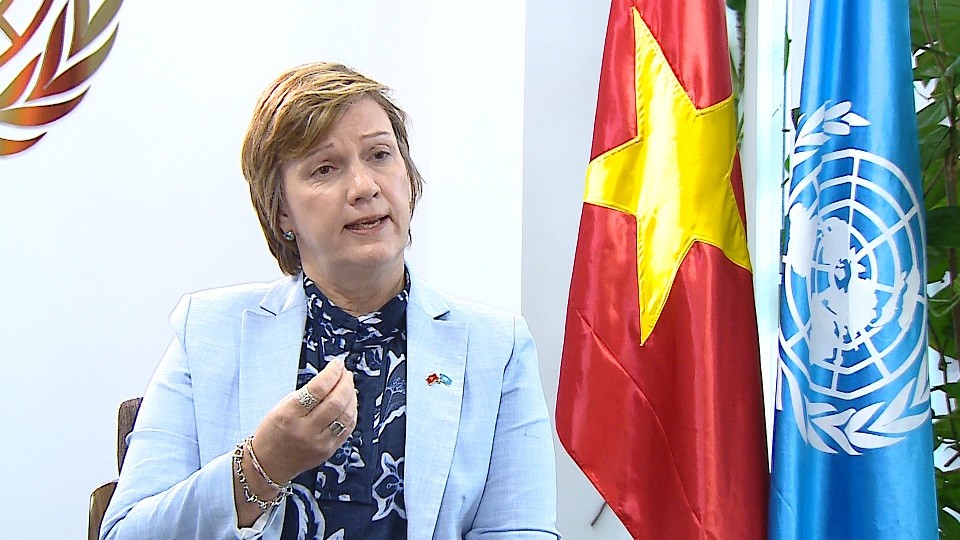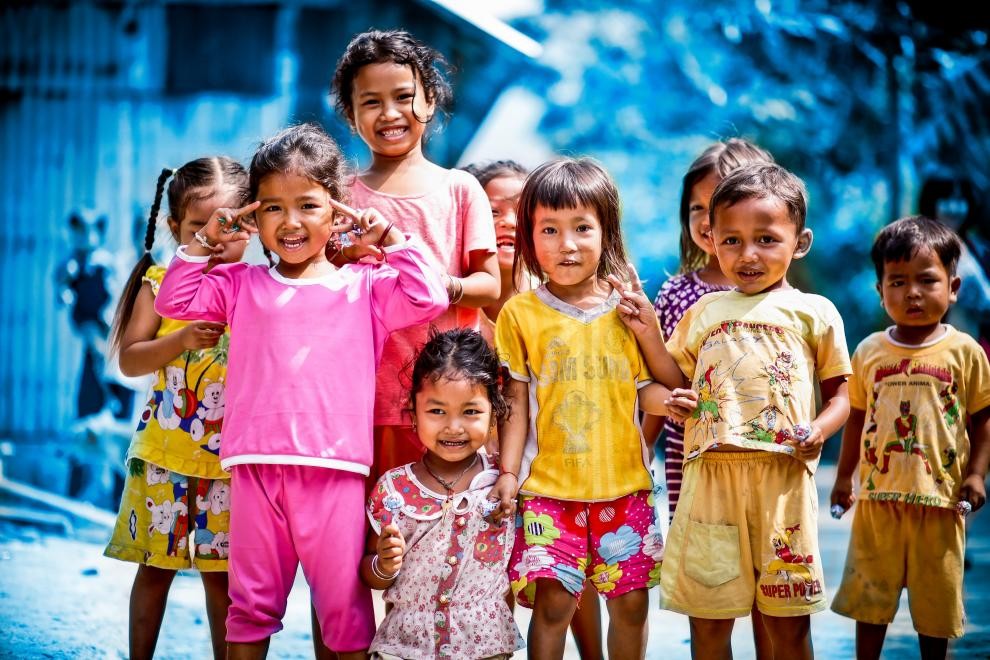
Vietnam's unwavering commitment to UN is applauded: UN Representative Rana Flowers
Latest
 |
| Acting United Nations Resident Coordinator in Vietnam Rana Flowers shared with WVR. (Photo: PH) |
Could you please share about the significances of the SDG Summit?
The SDG Summit marks the mid-point of the implementation of the 2030 Agenda on Sustainable Development and its 17 Sustainable Development Goals (SDGs). It provides an opportunity for world leaders to assess progress so far, to acknowledge where goals are on track and to take stock of where progress has been slow or in some cases deteriorated.
It is a critical moment for world development, where leaders of nations are implored by the Secretary General to commit to acceleration, to build momentum and to make breakthroughs that ensure that the people of the world and the planet we occupy are in a far stronger position at the end of this decade. A lot can be done in 7 years – with the right political will.
It is clear, from the multiple and interlocking crises that impact the world – that this is not a moment for business as usual – in the words of the Secretary General in his report to the Summit – the progress to date points to “a promise in peril” – thus the Summit must represent a turning point, an urgent call to action, to secure the world leaders’ commitment, to raise momentum and breakthroughs, to deliver in the words of the Secretary General a "Rescue Plan for People and Planet" with concrete targets, priorities and actions as well as the means of implementation including financing to help drive SDG acceleration in the remaining years towards 2030.
The goals represent a promise, a commitment that Governments make on a world stage – where they must be true to that promise to take action, measure all goals and drive change and progress in their own countries.
The Government of Vietnam will go to the Summit with a national report that shows where good progress has been made; and with every other leader in attendance – they will be expected to strongly commit to addressing where progress has not been as strong, where Government funding is needed, where data is missing, where the action to protect biodiversity, to stem the pace of climate crisis is too slow and where people are at risk of being left behind.
What would the UN’s view on the importance of Vietnam’s National Commitments and Actions in the upcoming SDG Summit?
Vietnam’s National Commitments to be presented at the SDG Summit are a testament to people development, to Viet Nam’s strong commitment and resolve to the 2030 Agenda for Sustainable Development and the 17 SDGs – upholding the promise of leaving no one behind in its national development journey.
Vietnam’s commitments and actions in the upcoming SDG submit are very important. First, as one of the countries which has made relatively good progress on the SDGs, Viet Nam can show case and share valuable lessons with other countries.
As the 15th most populous country in the world, and one of the most integrated and fast growing economies, Vietnam can use its voice effectively to contribute ideas and push for increased investment and innovation to accelerate the SDG implementation.
And really the stronger Vietnam’s commitments and actions are on SDGs going forward – the more development partners will view positively provision of financial and technical resources for acceleration of SDGs including to address the climate crisis – where Vietnam is among the top 20 countries worse affected.
| "I believe Vietnam will go to the Summit showing the strengths of its progress as well as reflecting on the areas that are yet to show as strong a progress as they would hope". |
And I believe Vietnam will go to the Summit showing the strengths of its progress as well as reflecting on the areas that are yet to show as strong a progress as they would hope.
Introducing renewable energies; capitalizing on the fact that Vietnam is fast becoming a global powerhouse for solar panel production; reducing dependency on coal, protecting biodiversity and ensuring clean water and waterways; transforming education, addressing gender disparities; improving the nutrition of children – these are examples of development indicators that deserve urgent attention today not just because of a global review in 7 years - but because the countries that lead on these areas will be leading the world in economic growth, protection of planet and prosperity for its people.
The National Commitments provide a crucial pathway to mobilize participation and support from all stakeholders (whole-of-society approach) and across the government’s institutions (whole-of-government approach) at all levels to accelerate the SDG achievement by 2030.
 |
| Vietnam has made considerable progress in various goals and targets of SDGs. (Source: UNICEF) |
What is your assessment of Vietnam's efforts, achievements as well as challenges in implementing Sustainable Development Goals during the past years?
Vietnam has made considerable progress in various goals and targets. For example, Vietnam has progressed well for targets related to poverty reduction, access to basic water and sanitation services, industrial and infrastructure development and access to ICT and internet.
But we lost years to COVID-19 and other crisis and there are signs of reversing progress in some targets. For example, on natural resource management, water resources and biodiversity, share of renewable energy and so on.
While several goals may be achieved by 2030 at the national level, disparities across regions or provinces and the risk of vulnerable groups (such as ethnic minorities, migrant workers, people with disabilities, adolescents and youth, the elderly, and others) being left behind still remain and they are hidden with the national average.
Deeply concerning is that there remains a large data gap for tracking and assessing SDG progress. Vietnam’s SDGs (VSDGs) have a total of 158 indicators, of which almost one quarter have no data. Less than half have data that is published annually – and nearly 50% have data that is not disaggregated not helpful to identify who is most affected where – breaking the data down by gender, age, location, ethnic population, children etc is essential
So clearly, Vietnam needs to boost the implementation and its investments to bring all SDGs back on track to achieve the 2030 targets.
This will not happen without a strong push by Government, a strong financial investment from Government, this cannot be one off financing but done through a clear financed plan to 2030.
Based on a UN led SDG costing exercise (by ESCAP), Viet Nam needs an investment of 11 percent of GDP per year from 2021-2030 period to achieve the SDGs.
Thus, developing an SDG Financing Strategy is key. While mobilizing additional financial resources such as climate and green finance is a priority, unlocking existing resources, including official development assistance (ODA) and enhancing domestic resource efficiency, is equally important.
Partners and friends of Vietnam are ready to support, and thus it is essential that the grants that are on offer are subject to simplified approval processes – with the right, unbureaucratic processes – there will be increased funding to accelerate SDG achievement.
Given the 45 years of partnership and what Vietnam has contributed to the UN’s agenda and multilateralism in recent years, how do you assess Vietnam's current role and position in the international arena?
It is important to recognize and appreciate Vietnam’s dynamic, evolving and valued membership in the UN over the last 45 years:
Vietnam officially joined the UN in September 1977, two years after the end of the war in 1975, although some agencies were already actively supporting Viet Nam. Over the past 45 years, Vietnam has transformed from a country reliant on UN assistance, to one with increasing capacity to strongly contribute to regional and global agendas.
As captured in the One UN Common Framework with the Government - The UN agencies here today are committed to continue to work hand in hand with the Government to support Vietnam to implement the 2030 Agenda for Sustainable Development.
Vietnam is a responsible member and a strong supporter of multilateralism anchored in the United Nations. Today, Viet Nam plays an incredibly important regional and global role, for example the active role in peacekeeping, as a non-permanent member of the UN Security Council for the 2020-2021 term, and as the ASEAN Chair for 2020.
Vietnam has demonstrated itself to be an increasingly active member of the international community, including its contributions to UN Peace Operations and to the UN Security Council's Women Peace and Security Agenda.
Vietnam is applauded for the unwavering commitment to the 2030 Agenda for Sustainable Development and Sustainable Development Goals (SDGs), as well as net-zero emission target by 2050, thus steering the country’s development on the path towards inclusiveness, sustainability and resilience.
With Vietnam’s election to the UN Human Rights Council for the 2023-2025 term, the UN looks forward to supporting Viet Nam in its plans to translate human rights commitments to actions.
The UN welcomes Vietnam’s pledges to strengthen human rights in all its dimensions, and encourages further action to prioritize gender equality, create space for a dynamic civil society, ensure open mechanisms for the Government to listen to the voice of the people, to prioritize women’s and children’s rights and to continue and to better protect the rights of vulnerable groups in line with international standards and good practices, leaving no one behind.
As the 15th most populous nation in the world and one of the most integrated and fast growing emerging economies Vietnam has both the status, the power and the duty to contribute and to influence the international arena.
The Summit is a moment for the world to come together to accelerate and transform commitments to respond to the urgency of poverty, the climate crisis, recovery from
COVID-19, and the need to pursue the fair and just path forward articulated by the SDGs to ensure that no one is left behind. A lot can be done in 7 years.












